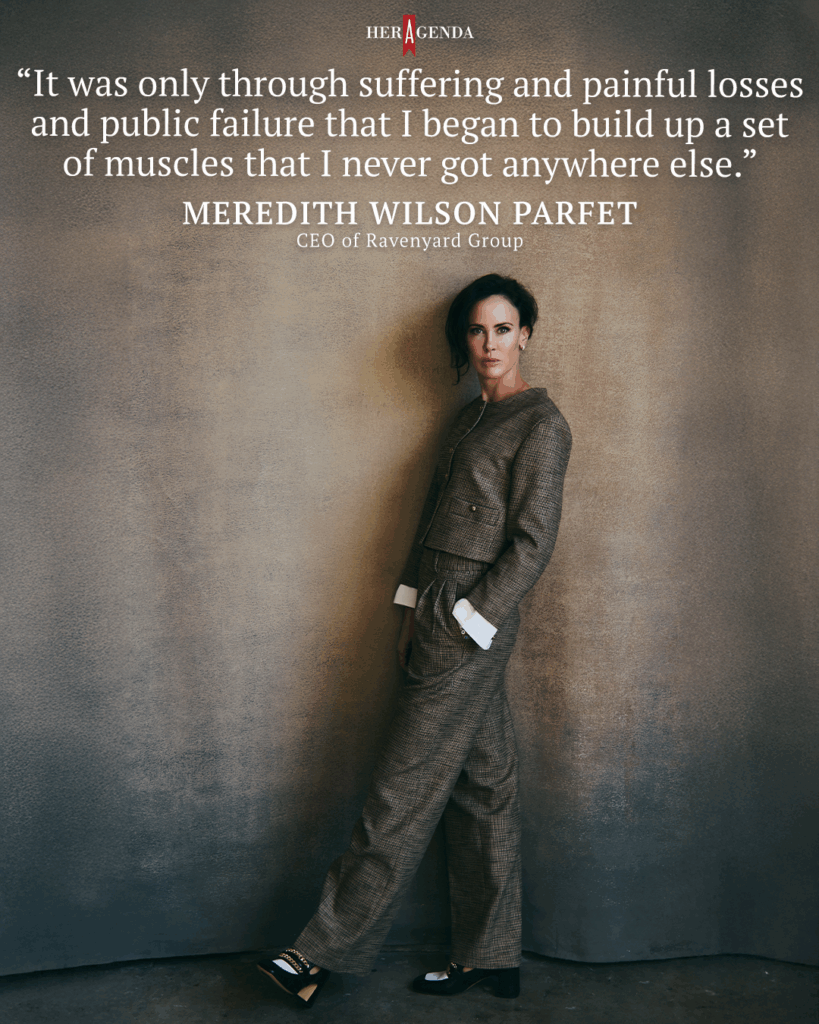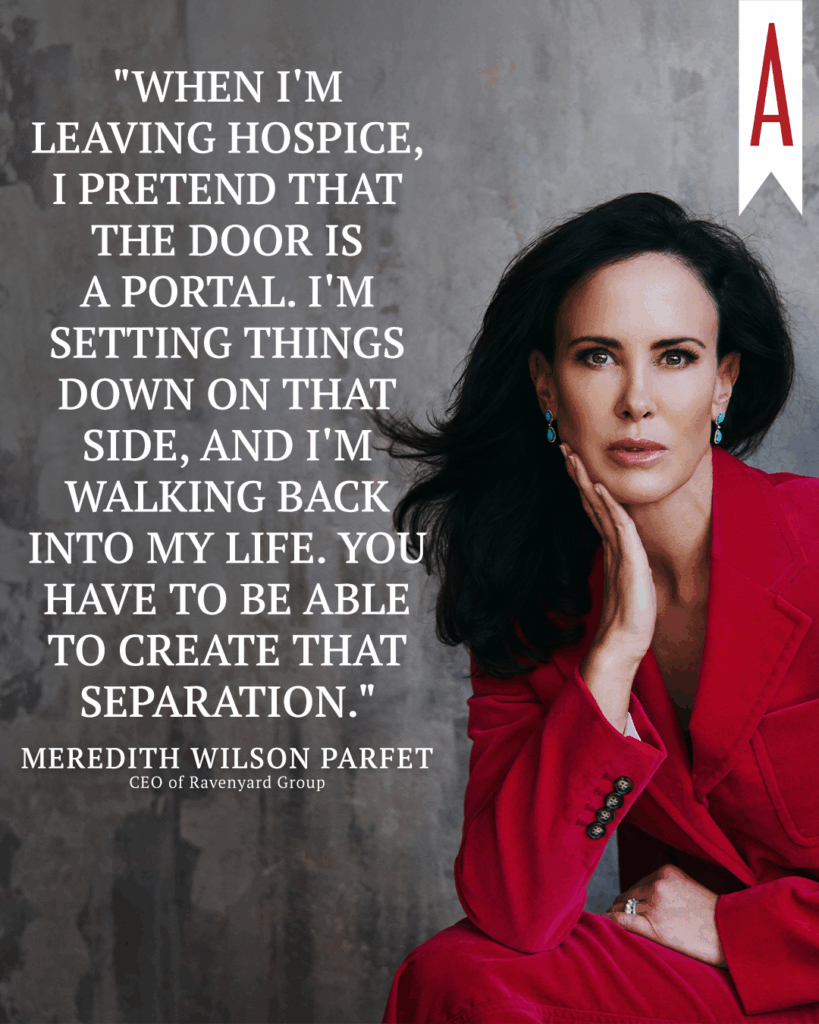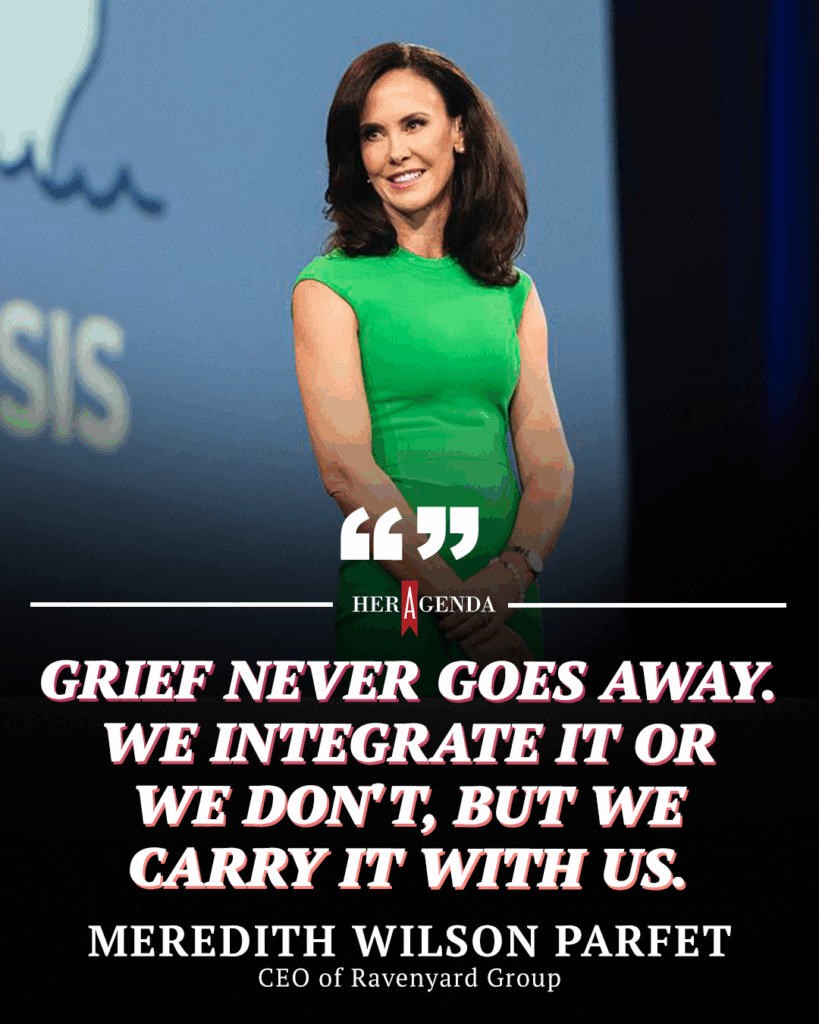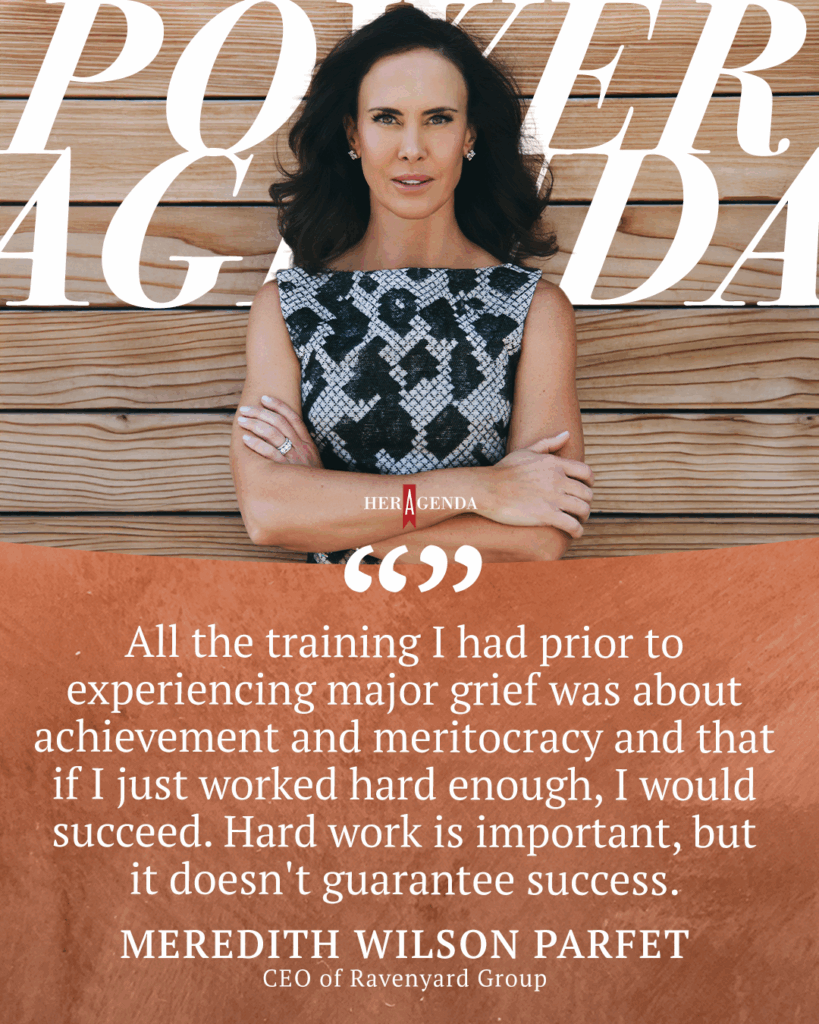Meredith Wilson Parfet brings an unusual dual expertise to crisis—she’s both a seasoned executive and a practicing hospice chaplain. Her background includes an MBA from Kellogg, two decades in asset management, and leadership roles at alternative investment firms. She’s also a certified end-of-life doula and Reiki Master, with a Master’s in Spiritual Care from Iliff School of Theology.
As CEO of Ravenyard Group, Meredith advises organizations facing legal, reputational, and operational breakdowns, blending technical precision with emotional intelligence. Her approach is informed by personal and professional loss, spiritual training, and years spent with dying patients and grieving families. Meredith also co-founded Denali Venture Philanthropy and serves on multiple nonprofit boards. In this conversation, she speaks about what it means to lead through the worst, and why real transformation often begins where most people want to turn away.
Her Agenda: How did your personal experiences with tragedy and near death reshape your understanding of leadership?
Meredith Wilson Parfet: So much of business leadership in particular is defined by success culture. So you’re rewarded for merit, you’re rewarded for achievement, you’re rewarded for beating the competition, getting things right. Often that puts you in positions of leadership. And yet I don’t think success culture gives us the tools to relate to other humans in any effective way.
It was only through suffering and painful losses and public failure that I began to build up a set of muscles that I never got anywhere else. And so you think about going to business school and they train you in all these different disciplines. Sometimes they’ll have leadership classes where they talk about being authentic, but I don’t think until you can recognize that people have an inner world and that their inner world has all this complex set of emotions. And often it’s about fears and worries and traumas and tragedies and all those things that they’re carrying with them. Only when I experienced those things, was I able to look at people and say, ‘oh, there’s so much more going on here.’ That to me is the thing that makes you relatable and it helps you lead.
Early in my career, I wasn’t, I don’t think I was empathic. I thought people’s work and their lives were totally separate and that I was supposed to teach people how to achieve. And now I look at it as I’m meant to accompany people on their journey. And if I have something to share, great. And if I have something to learn, great. And it’s much more collaborative.

Her Agenda: What does organizational grief look like and how is it different from individual grief?
Meredith Wilson Parfet: I don’t know that there’s such a thing as organizational grief so much as it’s a collective of individuals who are grieving. Sometimes people will create the differentiation between grief and mourning. They will say that we mourn together, but we grieve alone, and I think that can be true. Organizations that face major loss, like a fatality or a big scandal or bankruptcy or a startup that goes out of business. I mean, those are all different forms of grief, but they can be grief inducing for an organization. I think that more often what you see organizationally is that it throws things into chaos and that disorder organizationally exacerbates people’s individual grief.
So what you see are people grieving, right? If there’s a workplace fatality, people grieve that intensely. But what happens organizationally is that things go into chaos. That chaos just makes it harder for them to process what’s happened. And so part of my work is how do we bring order to the chaos and create a safe space for the individuals to grieve within a structure that’s comforting or at least supportive to what they’re trying to accomplish.
Her Agenda: In your experience, how do high performing teams typically respond to crises and where do they often go wrong?
Meredith Wilson Parfet: Two things happen commonly. One is we ignore people’s inner world. We ignore that they’re having normal biological responses to stress. So I use the language of people either bury their emotions, their grief, the energy of crisis, or they detonate it. You can look at that in the research as fight or flight or freeze moments.
What are our patterns? Well, we all have that. When a crisis happens, you’re sitting in a boardroom. Half the room is going, oh my gosh, these awful feelings, I’m compartmentalizing them. I just have to get things done. And the other half of the room is like, we’ve got to get this out. We’ve got to talk about it.
Most people don’t know their patterns. They don’t know how they deal with stress. So all that comes into the boardroom with them. I have seen even the best leaders, the most seasoned senior people running billion dollar companies absolutely behave erratically because of the stress of the crisis because they’re just not aware of it.
So step one, understand that you have an inner world, understand that everyone does, understand that people have stress patterns. If you’re able to practice that self-examination, then when you walk into those spaces, you’re like, all right, I’m doing what I typically do. I’m detonating everywhere. I’m compartmentalizing and behaving like a robot. That self awareness is what we have to bring into the boardroom.
The second thing you see teams do in crisis is they jump to a response before they ever structure and define what it is they’re working with. And so we always push people, define it. What is the crisis? What are we working with here? When you ask that question, you’ll get 50 different answers. Well, we think it’s this or we think it’s that. Just that act of defining the crisis gets people aligned on what it is they’re trying to solve for.
What you see most teams do is jump to call the lawyers and write a calm statement. About what? For what? For what end? What’s the point? What’s the goal? What’s the priority? What are we trading off? What are our decisions? We get that chaos in the room and we get all these messy people in the room. Nobody makes good choices.

Her Agenda: How do you define success when working with a client in crisis?
Meredith Wilson Parfet: My partner and I laughingly say that if they haven’t told us they love us at the end, using the word love, then we probably failed. Crisis is such a tender experience when you’re on the inside of it with people. Having that reflect back on us to say we felt supported, we felt cared for, we felt like you weren’t judging us. We felt like you were a safe, confidential space to talk about whatever it is that they were feeling in the moment. Especially leaders who often have to hide what they actually feel. It doesn’t mean they don’t feel it. And it doesn’t mean they’re regulating it.
The better leaders tend to keep it inside, but then they have nowhere to put it. And it’s very lonely and it’s hard to make good decisions that way. So success for us looks like a leader saying, ‘I didn’t have anyone else to go to and you stood there with me.’ They also tell us we love structure so we’ll go to them and say, ‘Here’s your checklist. Here’s what you need to do tomorrow. Here’s the order that you need to follow. Here are the steps you need to take.’ That is comforting to people. And so that would be a measure of success.
The most important thing is we will get follow-ups from people we’ve worked with two or three years later, once the kind of immediacy of the crisis has died down, that’s when we know we’ve been successful because they’ll say things like, ‘It was awful and I couldn’t have lived through it without you.’ And that’s a piece of like, okay, good. We did a good job. We helped them in the moments that were the most pivotal for them. That’s the feedback when we get it years later that you’re like, that was a job well done.

Her Agenda: Crisis management must be intense. How do you personally stay calm and grounded under the pressure when working with different clients?
Meredith Wilson Parfet: It was actually my chaplaincy training that prepared me best for that. So I’m a hospice chaplain a couple shifts a month, and I have a master’s degree in spiritual care and also my doula work. One of the important things they teach you is the difference between empathy and compassion. Empathy is, I feel what you feel. I am taking on your feelings and I’m going to carry that around. Sometimes that’s important because it allows us to relate to other people. But if every crisis I went into, I said, I feel what you feel. Then we’re both taking on the dysregulated fear, emotional strain, complexity, grief, whatever it is. My job is not to empathize. It’s to show compassion. It’s to say, this is not my grief. This is yours, but I will stand with you.
I will care about you with compassion. And so part of it is a mindset of, this is not my grief. But part of it is also, I have a number of rituals that I follow. I have Reiki training. And so one of the things Reiki is about is energy. So one of the things that I will do, whether it’s leaving a hospice session or whether it’s working with a client, is I’ll Reiki myself to say, I’m going to clean my energy off because this isn’t mine. And I’m going to leave it here at the door. When I’m leaving hospice, I pretend that the door is a portal. I’m setting things down on that side, and I’m walking back into my life. You have to be able to create that separation. Now that said, it is hard in the middle of a crisis, not to feel the stress and intensity and loss and worry and heartbreak that crisis actually causes. And some days you just carry it with you. And there are some clients or some work you never forget.
Her Agenda: How has your experience in hospice work influenced how you approach leadership or decision-making in your business?
Meredith Wilson Parfet: There was a whole set of muscles I didn’t know I had, and I didn’t know I needed. And that, in all of my business training, it’s about fixing, it’s about solving and that’s necessary. That need for order is so important in a crisis, but I didn’t know how to turn the fixing brain off.
I didn’t know how to just bear witness to what people were experiencing. I didn’t recognize that we’re human everywhere. And so I had all these arbitrary divides like what work did and what home did and what personal was. And it wasn’t until I grieved in a lot of different settings that I was like, oh, I’m this griever at work. I’m this griever at home. So, I bring that mindset into my work with leaders that sometimes my job is to fix things. And sometimes my job is simply to sit next to them in hardship and say, I’m here. I’m a stable, neutral place for you to put things, and I have your back. That set of chaplaincy muscles serves me better as a leader than anything I ever learned in any other setting.

Her Agenda: What key component do you want boards and executives to know about the long tail of trauma after an organizational crisis if they find themselves in one?
Meredith Wilson Parfet: There is a habit culturally around grief and hardship and suffering universally, whether it’s personal loss, professional loss, that one, it makes us uncomfortable. And so we avoid it. We’re a death denying culture. We hate talking about suffering. No one wants to do it. I have never once in my entire academic career taken a class on failure.
And yet it’s the thing that’s been the hardest to figure out through my entire career. So that one is okay to continue talking about it. It’s okay to continue processing it.
Part two is we believe that there’s an end to it. They should be over it. Well, we should be beyond it. Grief never goes away. We integrate it or we don’t, but we carry it with us. And organizationally it’s the same thing that if you’ve gone through a major round of layoffs or some like major dislocation in the C-suite or some tragedy, people don’t just get over it. They don’t just like to move right on. And so allowing for that to take a long time and that it changes an organization forever.
One of the definitions of crisis is that it’s a turning point between life and death. It means you can’t go back to the way things were. So that idea of enough time has passed. We can’t go back to how things were. It wouldn’t be a crisis if you could go back. And so it’s this reorientation of what does the future look like? What is our process for getting there? Can we give people room to say they’re not over it yet? Can we imagine something different versus trying to go into that denial of it’s just going to go back to the way it was.
Again, these are human skills, not necessarily board skills, but they apply everywhere.
Her Agenda: What’s one belief about success or failure that you’ve had to unlearn over the course of your career?
Meredith Wilson Parfet: All the training I had prior to experiencing major grief was about achievement and meritocracy, and that if I just worked hard enough, I would succeed. Hard work is important, but it doesn’t guarantee success. And I think we fall into these traps, especially in business, that we have control, that if we work hard and achieve things, we’re going to be successful. And that failure is somehow a reflection on your character. What grief has taught me, I have no control ever. Control is a myth. Failure and suffering are components of human life. Some people have it, and they didn’t do anything to deserve it. Some people suffer intensely, and they didn’t bring that upon themselves, and it’s not because they didn’t work hard.
That failure and acknowledging that failure publicly and acknowledging suffering and talking about it publicly has given me a way to talk to anyone because I say, here, let me tell you all the things that I’ve done, that I failed at. And it’s opened me up to saying, I have lots of flaws. I have lots of bad habits. What does that mean? What does that ask of me? Who am I supposed to be in the world? And it was grief that made me ask those questions. It was grief that made me say, what is social justice? What is human suffering? What is meditation, prayer, spiritual questions, existential questions? Those are the things that I’ve learned out of failure that I never learned out of success. And those are the things that have helped me connect with others so much more than my resume.
[Editor’s note: This interview has been edited for length and clarity.]








